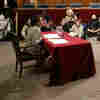
The House Will Vote On A Select Committee To Investigate The Jan. 6 Riot


Supporters of Donald Trump try to break through a police barrier Jan. 6 at the U.S. Capitol. The House of Representatives is set to take up legislation Wednesday to create a select committee to investigate the insurrection. Julio Cortez/AP hide caption
toggle caption
Julio Cortez/AP

Supporters of Donald Trump try to break through a police barrier Jan. 6 at the U.S. Capitol. The House of Representatives is set to take up legislation Wednesday to create a select committee to investigate the insurrection.
Julio Cortez/AP
The House of Representatives is expected to take up legislation Wednesday to create a select committee to launch a new inquiry into the Jan. 6 attack on the U.S. Capitol, marking the latest turn in a partisan fight to investigate the riot.
Senate Republicans blocked a move last month to vote on an outside commission, leaving Democratic leaders with plans to move forward with a House select committee instead. But some Republicans who supported the independent commission now say they’ll oppose the select committee.
Already, several congressional committees have launched their own inquiries into the riot, which have run parallel to criminal investigations by the FBI that have led to more than 500 arrests connected to the breach of the Capitol.
“We hope to get to the truth, the whole truth and nothing but the truth with respect to the events of Jan. 6,” said Rep. Hakeem Jeffries of New York, who chairs the House Democratic Caucus. The committee would look into “what happened that fateful day, why it happened and how do we prevent that type of violent assault on the Capitol, the Congress, and the Constitution from ever happening again.”
How the panel would work
The panel will face challenges confronted by other previous select committees, including the one formed by Republicans to look into the 2012 terrorist attack in Benghazi, Libya. House Speaker Nancy Pelosi, D-Calif., has not yet named the chair of the panel or the Democratic lawmakers she plans to tap to be on it.
The panel will have subpoena power and a total of 13 members, with eight selected by Pelosi and the remaining five by House Minority Leader Kevin McCarthy, R-Calif. But Pelosi has not ruled out a veto of McCarthy’s selections since the panel’s resolution directs those appointments to be made with her consultation.


Pelosi has also signaled that she could use one of her eight picks to select a Republican. Quickly, Rep. Liz Cheney of Wyoming, who was recently ousted from her House leadership role by McCarthy and others, became a potential contender. Cheney hasn’t ruled out the possibility, saying the final decision is Pelosi’s.
For now, House Republicans, like Democrats, aren’t saying who could be on the committee, but they are quick to slam the plan.
“If you look at the last vote (on the commission), it was overwhelmingly opposed by Republicans and what we’ve said is, look there are a lot of standing committees that have jurisdiction,” House Minority Whip Steve Scalise, R-La., said. “Speaker Pelosi should be exercising that same ability — not going down a partisan route.”
But this time, Scalise and others could have more company to oppose the panel. Among them, Rep. John Katko of New York, the ranking Republican on the House Homeland Security Committee, who helped broker the deal on the bipartisan commission with the committee’s top Democrat, Chairman Bennie Thompson of Mississippi.
On Tuesday, Katko called the panel a “turbo-charged partisan exercise,” arguing it would be skewed with Democratic picks, with all 13 members ultimately selected by Pelosi. As a result, Katko said he’ll vote no on the select committee and can’t envision a scenario where he would serve on it.
“I led the charge to create a Jan. 6 commission that would be external, independent, bipartisan and equitable in membership and subpoena power,” Katko said. “The select committee proposed by Speaker Pelosi is literally the exact opposite of that.”
How a bipartisan commission failed
Pelosi announced the plans to move forward with the committee last week. It marked nearly a month after the Senate fell a few votes short to move forward with floor debate to take up bipartisan legislation to establish the independent commission to investigate the insurrection.
Six Republicans joined Democrats to move to debate, with a final Senate tally of 54 to 35, that fell short of the 60 votes needed to proceed. Earlier in May, the House approved the commission plan by a 252-175 vote, with 35 Republicans joining Democrats.

The legislation was modeled after the commission established in the wake of the 9/11 attacks, with a panel of commissioners divvied evenly between the parties and with bipartisan subpoena power.
Ahead of the votes, former President Donald Trump blasted the plan and asked GOP leaders to reject it. Both McCarthy and Senate Minority Leader Mitch McConnell, R-Ky., followed suit, along with a majority of their party in both chambers.
Pelosi and other Democrats have blasted Republicans for blocking the move.
“They had an opportunity, and I don’t think it should be lost on any of us that Mitch McConnell and Senate Republicans turned this opportunity away to have a bipartisan, even-split commission,” said Rep. Pete Aguilar of California, the chief deputy whip for House Democrats.
Source: https://www.npr.org/2021/06/30/1011415934/the-house-will-vote-on-a-select-committee-to-investigate-the-jan-6-riot

















